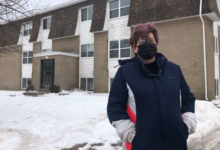High Park residents are told they’re evicted, that their units are actually in a ‘tourist home’
Some tenants in the west end have been told they have to vacate their homes by Oct. 14 because their rooming-house-style building is actually a “tourist home” and therefore not subject to the same rules as apartments.
Zoltan Torok, 68, has lived there since May, after he responded to a newspaper advertisement offering a room at 320 Roncesvalles Ave. near High Park for $180 a week.
“They advertise room for rent,” he said in a Hungarian accent. “They don’t say tourist home.”
Torok said the building’s manager told him a few weeks ago that he and all the others living there, in rooms with shared kitchens and bathrooms, had to leave.
“I’m not going to go,” Torok said, adding he’s never received any written notice.
“If it’s no paper, no signature, no stamp on it, I don’t care. I go to the court.”
The community legal clinic working to organize residents and the local city councillor see this as just the latest example of a landlord trying to skirt the rules in an effort to evict tenants, then renovate and rent the units for more money.
Property records show the building, Windsor House, is owned by a numbered company, which bought the building in 1985.
Landlord argues the rules for evicting tenants don’t apply
Its representative Samuel Lewkowicz responded to CBC Toronto via email, with multiple words underlined.
“Windsor House is a tourist home,” the email reads. “Tourist homes operate like hotels. People who check-in to tourist homes, like people who check-in to hotels are guests, they are not tenants.”
Given that, Lewkowicz writes, the property does not fall under the Residential Tenancies Act, which does not permit evictions under these circumstances.
Hotels, motels, bed and breakfasts and tourist homes are among the types of temporary accommodations exempted from the provincial act under Section 5(a) of the act.
The local city councillor, Gord Perks, isn’t convinced this building falls under one of those categories, saying as far as he knows it’s a residential building.
“I’ve heard of landlords trying every trick in the book to try to evict people,” said Perks.
He’d like the provincial act tightened, to do more to protect renters.
“The province’s system gives landlords the incentive to invent flimsy excuses… to pick on low-income tenants, bully them and get them to leave their units.”
Staff member Cole Webber even received a trespass notice after meeting with Torok in his unit to discuss the situation.
It tells Webber he’s now banned from the premises. He argues the notice is invalid.
Webber also disputes the classification of Windsor House as a tourist home.
“When you pay rent to a landlord to live somewhere, you are in a landlord-tenant relationship, which is protected under the Residential Tenancies Act,” he said, noting some residents have lived there for many years.
Community legal clinic tells residents not to move
Webber has some advice for people living in the building.
“You don’t have to move out. Stay where you are and organize yourselves with your neighbours.”
Torok hopes he will be able to stay.
He said he has multiple health issues, including a hernia and problems with his hip and while his pension cheque covers his rent, he doesn’t think he can afford to move.
“I don’t know what to do,” he said. “First and last month, I cannot do it.”








Redes Sociais - Comentários